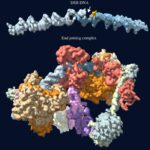Link to Pubmed [PMID] – 2203971
Link to DOI – 10.1038/347203a0
Nature. 1990 Sep 13;347(6289):203-6.
The aminoacyl-transfer RNA synthetases (aaRS) catalyse the attachment of an amino acid to its cognate transfer RNA molecule in a highly specific two-step reaction. These proteins differ widely in size and oligomeric state, and have limited sequence homology. Out of the 18 known aaRS, only 9 referred to as class I synthetases (GlnRS, TyrRS, MetRS, GluRS, ArgRS, ValRS, IleRS, LeuRS, TrpRS), display two short common consensus sequences (‘HIGH’ and ‘KMSKS’) which indicate, as observed in three crystal structures, the presence of a structural domain (the Rossman fold) that binds ATP. We report here the sequence of Escherichia coli ProRS, a dimer of relative molecular mass 127,402, which is homologous to both ThrRS and SerRS. These three latter aaRS share three new sequence motifs with AspRS, AsnRS, LysRS, HisRS and the beta subunit of PheRS. These three motifs (motifs 1, 2 and 3), in a search through the entire data bank, proved to be specific for this set of aaRS (referred to as class II). Class II may also contain AlaRS and GlyRS, because these sequences have a typical motif 3. Surprisingly, this partition of aaRS in two classes is found to be strongly correlated on the functional level with the acylation occurring either on the 2′ OH (class I) or 3′ OH (class II) of the ribose of the last nucleotide of tRNA.

